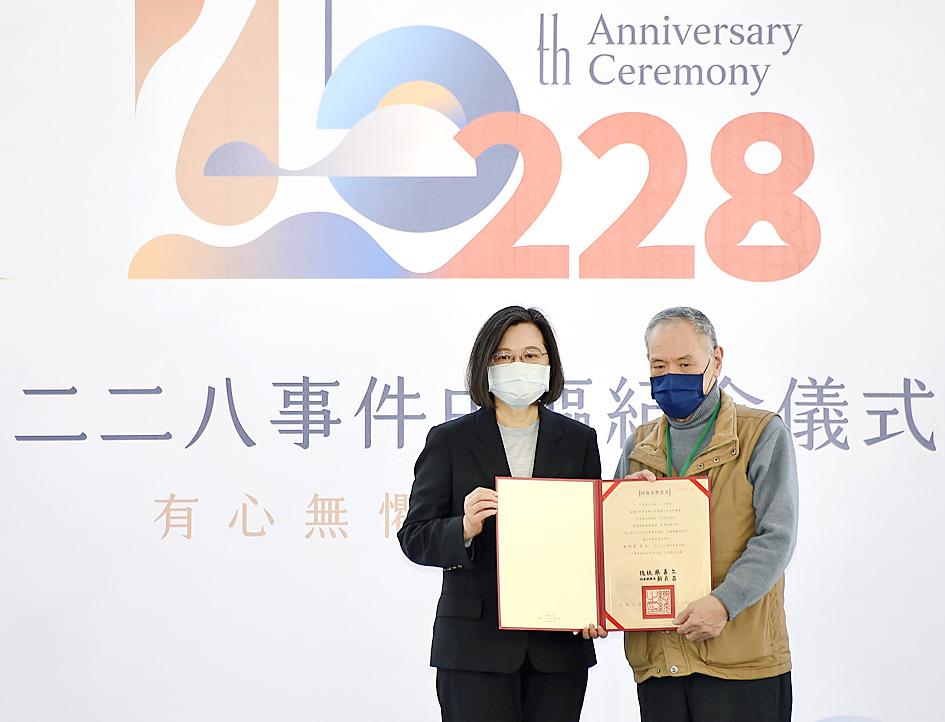The nation’s transitional justice efforts would soon reach a new milestone with the Cabinet taking over the responsibilities of the ad hoc Transitional Justice Commission, President Tsai Ing-wen (蔡英文) said yesterday during a 228 Incident memorial in Keelung.
During an address to commemorate the 75th anniversary of the 1947 Incident, Tsai said that the commission, established in 2018, would disband at the end of May after issuing its final report on human rights abuses under the then-Chinese Nationalist Party (KMT) regime.
The Executive Yuan would take over the commission’s duties, with a “transitional justice board” reviewing and coordinating tasks among government agencies, Tsai said.
Premier Su Tseng-chang (蘇貞昌) would head the initiative to ensure the government follows the commission’s suggestions, she said.
Tsai added that her administration would continue to pursue the transformation of Taipei’s Chiang Kai-shek Memorial Hall, which is dedicated to the former KMT leader who was president during the Feb. 28, 1947, massacre and the resulting crackdown that left thousands dead and was followed by nearly four decades of martial law, during which tens of thousands died, went missing or were imprisoned.
In the 228 Incident, then-Taiwan governor Chen Yi (陳儀) ordered the use of deadly force to quash civilian protesters. An estimated 18,000 to 28,000 people were killed during a subsequent government crackdown, which lasted into early May 1947.
“As a democratic nation, it is one of our basic principles that we should no longer have authoritarian-style commemorations to any former presidents,” Tsai said.
“The historical role of each of the nation’s former presidents should be judged by its people,” she said, adding that it was the government’s duty to review the nation’s authoritarian past so that people could make an objective judgement after considering all perspectives.
The government chose to hold this year’s memorial in Keelung to recognize the Keelung Massacre, Tsai said.
After the protest in Taipei’s Datong District (大同), the KMT regime on March 8, 1947, sent thousands of troops to the Port of Keelung, which marked the beginning of a brutal crackdown.
The troops killed about 2,000 people from March 8 to March 16, Tsai said.
Regarding Russia’s invasion of Ukraine, Tsai said that the whole world is watching Ukrainians unite and resist aggression to preserve their democracy and freedom.
She urged Taiwanese to recognize that a united nation could face and overcome challenges.
“As president, it is my responsibility to unite Taiwan and defend democracy,” she said.
Ukrainians are determined to defend their sovereignty, democracy and freedom, she said, adding that this determination has roused international support for the nation.
At an event at the 228 Peace Memorial Park in Taipei, former president Ma Ying-jeou (馬英九) urged the Tsai administration to avoid conflict with China, saying “peace has no losers.”
Ma said that Russia and Ukraine should make an all-out effort to build peace, adding that the same could be applied to Taiwan’s handling of cross-strait affairs.
Asked about the prospect of US assistance in the event of a Chinese attack, Ma said that although Washington would sell weapons and provide information to Taiwan, the chance of US troops being sent was low.
Ma’s comments echoed those of KMT Chairman Eric Chu (朱立倫), who on Sunday told reporters that the chance of Taiwan facing a similar situation from China would depend on the nation’s defense capabilities, commitment to peace and resolve to avoid provocations.
Source: Taipei Times - 2022/03/01





















